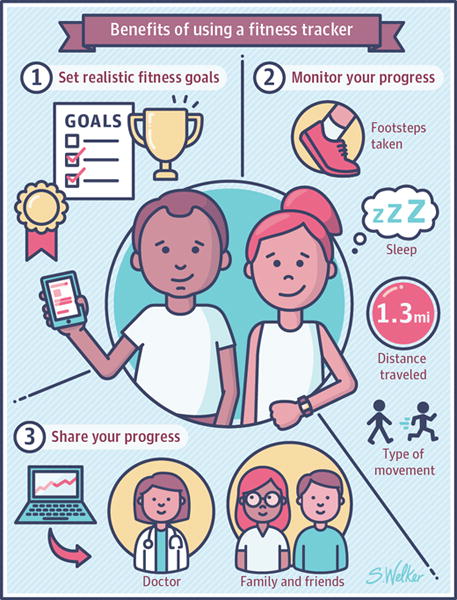What are fitness trackers?
Fitness trackers or activity monitors are devices with special sensors that can monitor your movement. Often referred to as “wearables”, these devices are typically worn around the wrist as a bracelet or embedded in a mobile phone or wristwatch. They can measure footsteps taken, distance traveled, type of movement (walk, run, jog), and quality and duration of sleep. Additional sensors may also monitor heart rate, blood pressure, oxygen levels, or even analyze sweat. Data from the wearable can be transferred to a smartphone or computer and uploaded via the internet. Connected smartphones and wearables can alarm or vibrate to encourage or motivate behaviors, such as exercise or sleep. As the technology matures, these devices will likely cost less, and it may become easier to share data from them with your health care professional, clinic, or hospital.
Can Fitness Trackers Prevent or Treat Heart Disease?
Professional cardiology society guidelines recommend that most patients participate in regular exercise. However, these societies have not yet given recommendations on how fitness trackers should be used. Furthermore, the majority of wearables have not been tested nor validated in appropriate clinical studies and therefore are not formally classified by the Food and Drug administration as medical devices. In fact, some devices may have substantial measurement error or decreased accuracy, particularly during intensive exercise. [1] Therefore, Fitness Trackers should probably not be used to determine exertional limits or as safety monitors.
What are the benefits of using a fitness tracker?
Despite these uncertainties, fitness trackers may have benefits to both our understanding of and potentially even improving our cardiovascular health. Physical inactivity is an important risk factor for cardiovascular disease. Fitness trackers may help motivate patients towards a healthier lifestyle by providing feedback, tracking and accountability to maintain regular exercise. Previous studies suggest that fitness trackers do increase physical activity and may even encourage weight loss. Many fitness trackers allow the wearer to review their exercise patterns over the previous weeks and months. By helping patients monitor their own activity patterns, these devices may encourage regular exercise. Patients may even share their exercise progress with their doctor or family members. Therefore, in the right context, a fitness tracker may provide the motivation and accountability to maintain or encourage a healthier lifestyle.
What is the future of fitness trackers?
As an increasing number of patients and clinicians become familiar with fitness trackers, these devices could play a larger role in healthcare. For example, some electronic health record systems allow patients to upload their wearable data directly into their medical record. Several health insurance plans offer incentives to members for achieving their activity goals. Like mobile phones, these devices may one day become an integral part of society and health care. Ongoing and future studies will be needed to determine if they can actually contribute to a much needed reduction in the risk heart of disease and its complications.
Figure.

Footnotes
Source: Case, M.A., et al., Accuracy of smartphone applications and wearable devices for tracking physical activity data. JAMA, 2015. 313(6): p. 625–6.
FOR MORE INFORMATION
- Centers for Disease Control and Prevention on Physical Activity. http://www.cdc.gov/physicalactivity/


